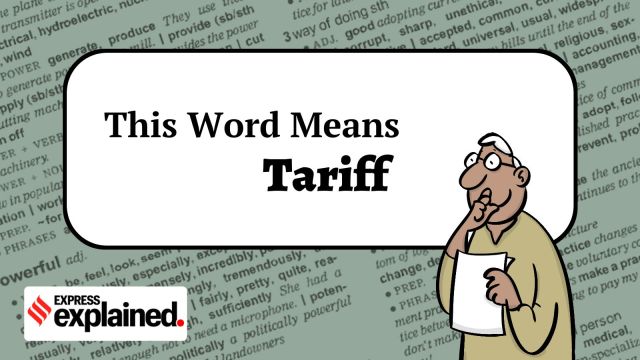This Word Means: Tariff
Every day, 500 words on a word (or expression) that has appeared in The Indian Express
 A tariff is a tax on imported goods and services. To President Trump, a tariff is “the most beautiful word in the dictionary."
A tariff is a tax on imported goods and services. To President Trump, a tariff is “the most beautiful word in the dictionary."WHY NOW?
On Sunday (March 30) US President Donald Trump announced that he will impose tariffs on all countries. He confirmed that the tariffs that would become effective on April 2 – which he has called ‘Liberation Day’ – would affect all countries and not a select few, as previously reported.
“We would start with all countries, so let’s see what happens,” Trump told reporters aboard Air Force One.
WHAT IS A TARIFF?
A tariff is a tax on imported goods and services. To Trump, a tariff is “the most beautiful word in the dictionary.”
Tariffs are typically a percentage of the product’s value.
WHY DO COUNTRIES IMPOSE TARIFFS?
Tariffs are typically used as a protectionist measure to defend a country’s domestic industries against rival imports from foreign countries.
The income from tariffs could boost government revenues, which in turn could be spent on public welfare measures.
AND WHY DOES TRUMP LOVE TARIFFS?
For the US President, tariffs are a bargaining chip to force concessions from American trading partners on unrelated issues.
Trump also believes that tariffs can help resolve the US’s $1.2 trillion trade deficit with other countries, the imbalance caused by the country importing more than it exports. He also believes that the US charges low tariffs against the high duties and trade barriers imposed on American exports by other countries.
Trump also believes that tariffs would reduce the demand for imported products, and increase the demand for American goods, in turn, boosting manufacturing jobs in the US.
WHO BEARS THE BURDEN OF A TARIFF?
Depending on the demand for the product and the availability of viable substitutes, the burden of a tariff could fall entirely on the consumer or be shared with the manufacturer.
Tariffs add to the product costs, and importers, typically American companies, are affected by these. They typically choose to pass on the increased costs to consumers by increasing the prices.
However, tariffs also reduce the demand for goods exported by other countries, encouraging foreign companies to find ways to work around this, by cutting prices, to maintain their market share.
WHAT TARIFFS WILL BECOME EFFECTIVE ON APRIL 2?
There is little clarity on how the universal tariffs would be implemented, but these are expected to become effective on Wednesday.
This would accompany an array of taxes already announced by the President, including:
- 25% import taxes on cars and car parts coming into the US.
- 20% tax on all imports from China, which became effective from March 4.
- 25% tariffs on imports from Mexico and Canada, which became effective in March. This does not include energy from Canada charged at a lower 10% rate, and goods shipped under the US-Mexico-Canada agreement (USMCA) are exempt from taxation.
- A 25% tariff on all steel and aluminium imports into the US, which became effective in March.
HOW HAVE DIFFERENT COUNTRIES RESPONDED?
- China has introduced 10-15% taxes on American agricultural goods, and has declared its readiness for “any type” of war.
- Canada slapped a 25% tariff on US steel, aluminium and other goods valued at C$60 billion ($42billion).
- The EU announced $28 billion in tariffs on American goods, from American alcohol to steel and aluminium products.



- 01
- 02
- 03



































